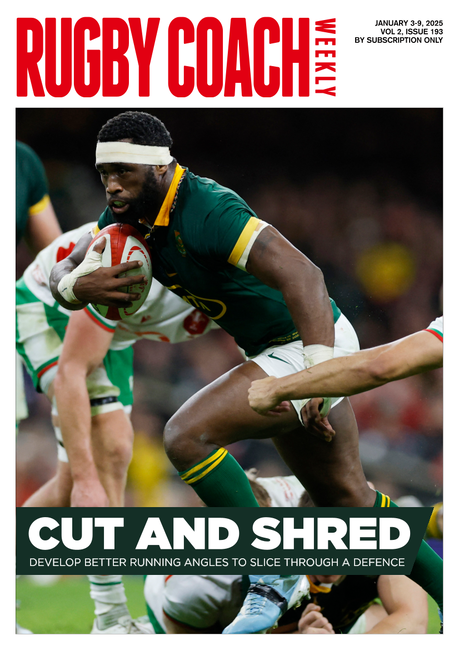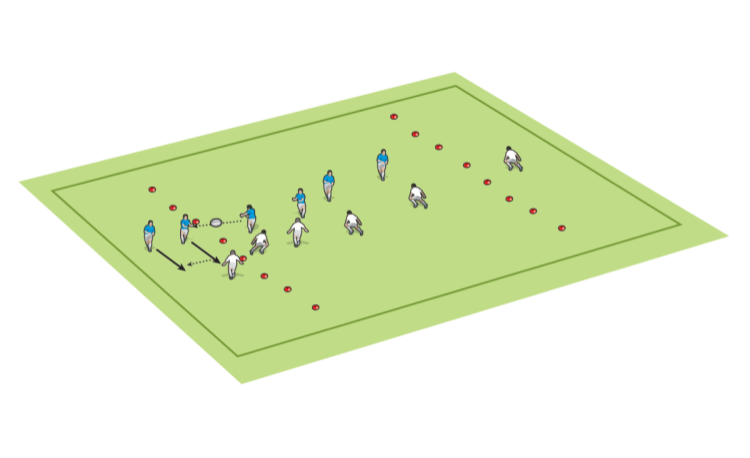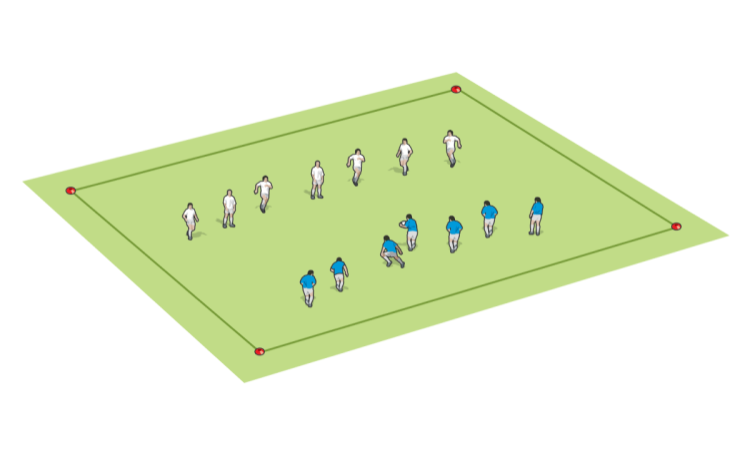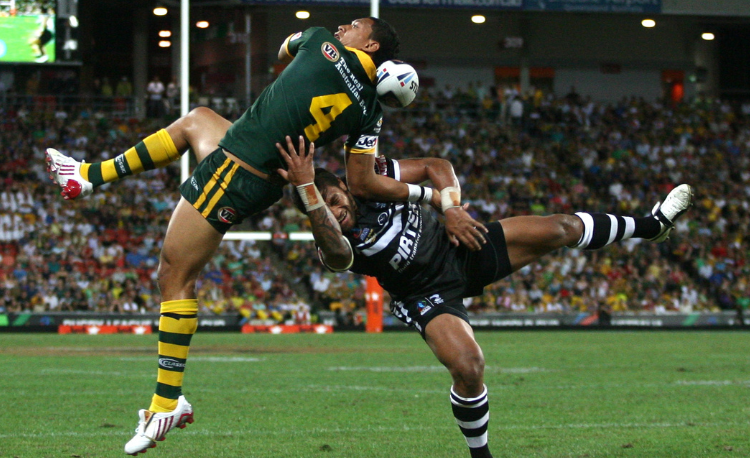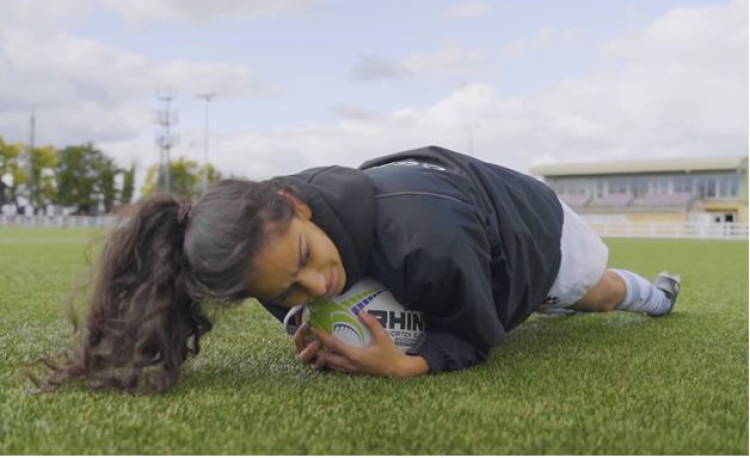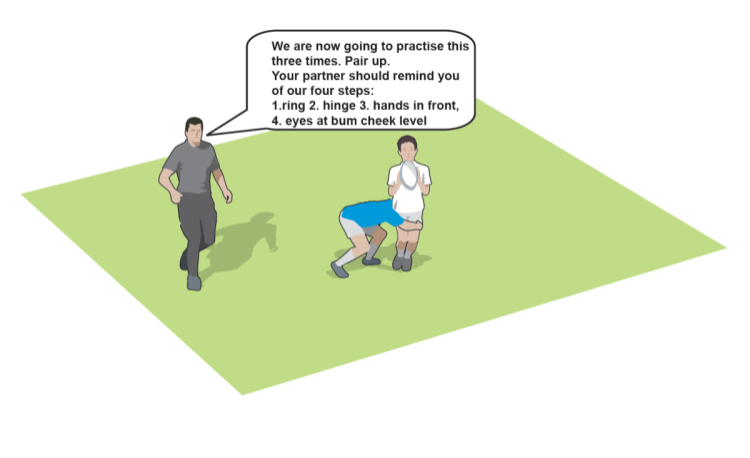Do it again… and repeat
The best players perform miraculous skills at the right times. They will say it is all down to practise, practise, practise. But the real secret is more than that: Repeatability. Here are five ways to create this in training. By Dan Cottrell
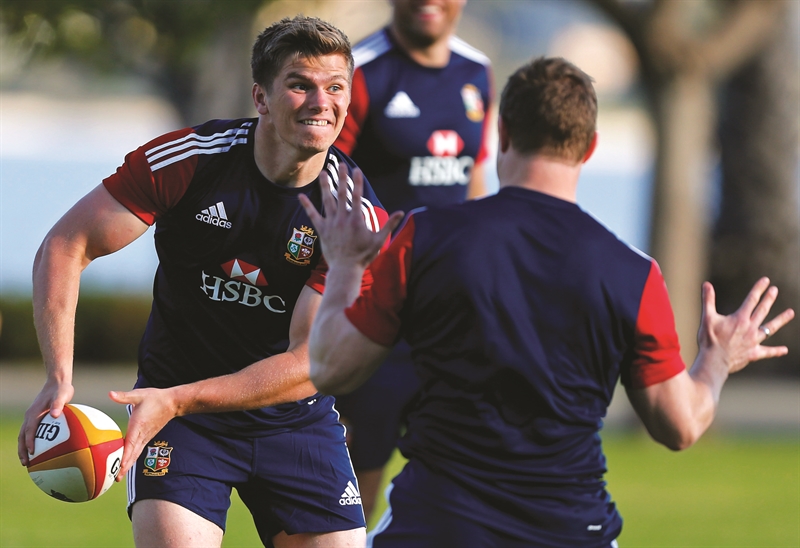
Performing a skill – such as a pass – under pressure improves technique
Repeatable techniques become habits. They can be performed on a regular basis. They are ingrained, so it feels to the player that he does not have to think about what he is doing.
But your first task as a coach is to make sure the technique or skill is correct. You must be clear in your mind what is good practice. You have to break bad habits and hone perfect technique.
Have a template in your mind about what the player should be doing. For instance, a good body profile for a prop, the right footwork and follow through for scrum half, the correct ball position for a kicker, etc.
Skills are techniques performed under pressure. Your training sessions must strike a balance between learning a technique and putting it into practice under pressure.
Rugby is a game of time and space. Therefore, reduce both so you can test the technique of the player. You can do this easily by adding in defenders or attackers, by changing the dimensions of the exercise or setting the stopwatch.
In a match, there are many uncontrollable elements for a player. The weather, pitch conditions, the opposition, the referee, and even his own team mates can all impact on how the player operates. So you have to create a certain amount of chaos in training to challenge the player to repeat his skills. For example you could change the ball to an old, slippery ball or overload the defence. Do it randomly. Can the player cope? If not reduce the chaos to rehone good habits.
Some players resort to repeat skills which give them confidence. For example, the hooker throwing to the front of the lineout, or the scrum half only passing long and flat off his stronger hand. Though this is positive and helps keep the player confident, it does not lead to a greater success. Push the players to use new techniques and skills. Only by expanding the boundaries will they grow as players, use better skills, and allow them to become habits.
Not every skill will be repeatable with success quickly. Identify these with the player and encourage them to keep trying. The very best players will do that for themselves – they take time away from training to focus on how they can form good habits.
The real test of repeatability of a skill is when a player is tired. Training under fatigue is often forgotten when creating pressure. Real rugby fatigue comes from physicality, the amount of ground covered with only short breaks between bursts. The obvious coaching point is to create scenarios where players are placed in these conditions and you can measure whether they have formed good or bad habits.

Performing a skill – such as a pass – under pressure improves technique
01
Repeat good things
Repeatable techniques become habits. They can be performed on a regular basis. They are ingrained, so it feels to the player that he does not have to think about what he is doing.
But your first task as a coach is to make sure the technique or skill is correct. You must be clear in your mind what is good practice. You have to break bad habits and hone perfect technique.
Have a template in your mind about what the player should be doing. For instance, a good body profile for a prop, the right footwork and follow through for scrum half, the correct ball position for a kicker, etc.
02
Repeat under pressure
Skills are techniques performed under pressure. Your training sessions must strike a balance between learning a technique and putting it into practice under pressure.
Rugby is a game of time and space. Therefore, reduce both so you can test the technique of the player. You can do this easily by adding in defenders or attackers, by changing the dimensions of the exercise or setting the stopwatch.
03
Repeat in chaos
In a match, there are many uncontrollable elements for a player. The weather, pitch conditions, the opposition, the referee, and even his own team mates can all impact on how the player operates. So you have to create a certain amount of chaos in training to challenge the player to repeat his skills. For example you could change the ball to an old, slippery ball or overload the defence. Do it randomly. Can the player cope? If not reduce the chaos to rehone good habits.
04
Repeat with increasing success
Some players resort to repeat skills which give them confidence. For example, the hooker throwing to the front of the lineout, or the scrum half only passing long and flat off his stronger hand. Though this is positive and helps keep the player confident, it does not lead to a greater success. Push the players to use new techniques and skills. Only by expanding the boundaries will they grow as players, use better skills, and allow them to become habits.
Not every skill will be repeatable with success quickly. Identify these with the player and encourage them to keep trying. The very best players will do that for themselves – they take time away from training to focus on how they can form good habits.
05
Repeat when you are tired
The real test of repeatability of a skill is when a player is tired. Training under fatigue is often forgotten when creating pressure. Real rugby fatigue comes from physicality, the amount of ground covered with only short breaks between bursts. The obvious coaching point is to create scenarios where players are placed in these conditions and you can measure whether they have formed good or bad habits.
Reps without reps
-
Repetitions don't have to be boring, nor do they need to be exactly the same.
-
Use the mantra "repetition without repetition". The player will be doing the same skill, though the circumstances will be slightly different each time.
-
Use pressure, chaos and fatigue to help players test their techniques. Create good habits for different situations.
Newsletter Sign Up
Coaches Testimonials

Gerald Kearney, Downtown Las Vegas Soccer Club

Paul Butler, Florida, USA

Rick Shields, Springboro, USA

Tony Green, Pierrefonds Titans, Quebec, Canada
Subscribe Today
Be a more effective, more successful rugby coach
In a recent survey 89% of subscribers said Rugby Coach Weekly makes them more confident, 91% said Rugby Coach Weekly makes them a more effective coach and 93% said Rugby Coach Weekly makes them more inspired.
Get Weekly Inspiration
All the latest techniques and approaches
Rugby Coach Weekly offers proven and easy to use rugby drills, coaching sessions, practice plans, small-sided games, warm-ups, training tips and advice.
We've been at the cutting edge of rugby coaching since we launched in 2005, creating resources for the grassroots youth coach, following best practice from around the world and insights from the professional game.


